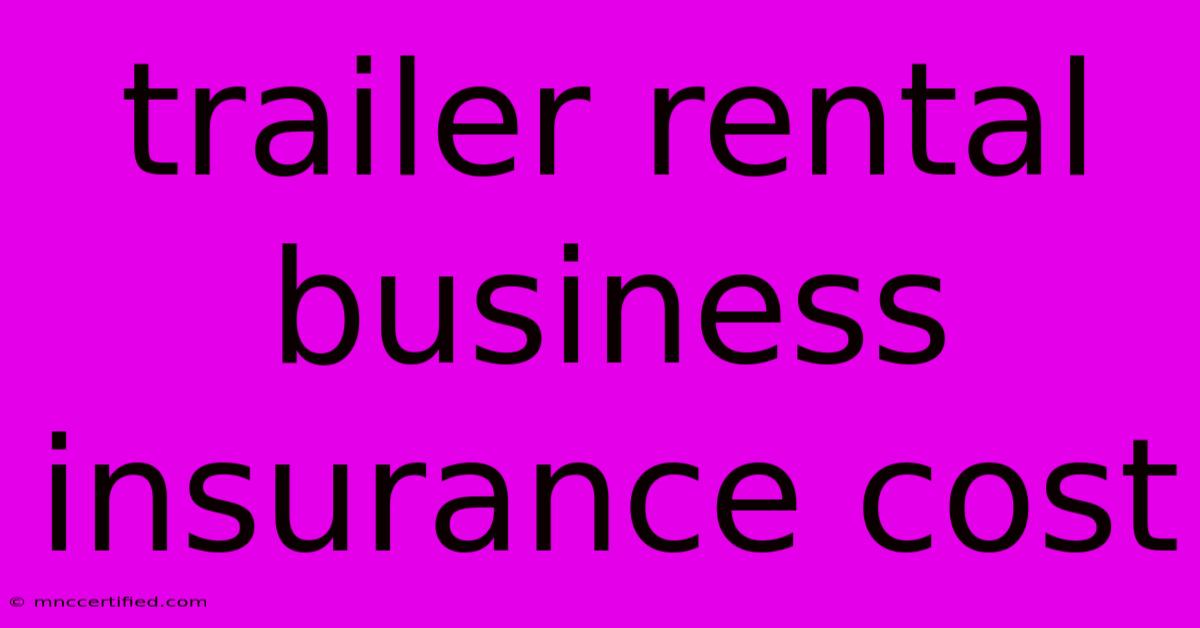Trailer Rental Business Insurance Cost

Table of Contents
Trailer Rental Business Insurance: Costs and Coverage Explained
Starting a trailer rental business can be a rewarding venture, but it's crucial to understand the importance of comprehensive insurance coverage. This article will delve into the world of trailer rental business insurance, breaking down costs, essential coverage types, and tips for finding the best policy.
What is Trailer Rental Business Insurance?
Trailer rental business insurance is a specialized type of insurance designed to protect your business from financial losses due to accidents, property damage, and liabilities. It's not just about covering your trailers; it also safeguards your business from potential lawsuits and other unforeseen circumstances.
Key Coverage Types for Trailer Rental Businesses
While specific coverage options may vary, here are some essential insurance policies for trailer rental businesses:
1. General Liability Insurance:
This crucial policy covers legal expenses and damages related to injuries or property damage caused by your trailers or your employees during rentals. It protects your business from lawsuits arising from accidents, even if you are not at fault.
2. Commercial Property Insurance:
This policy covers damage or loss to your trailers and other business property, such as tools, equipment, and office supplies, from events like fire, theft, or vandalism.
3. Business Auto Liability Insurance:
This insurance covers damage to other vehicles or property caused by your trailers or any vehicle used for business purposes, such as a tow truck. It also covers medical expenses for injuries sustained by others in an accident.
4. Workers' Compensation Insurance (if applicable):
If you employ workers, this policy is essential. It provides coverage for medical expenses, lost wages, and death benefits for employees injured while working.
5. Inland Marine Insurance:
This policy protects your trailers during transport, even if they are not being towed by your vehicle. It covers damage from accidents, theft, and weather events.
6. Umbrella Liability Insurance:
An umbrella policy provides additional liability coverage above your general liability policy, offering broader protection for your business in case of significant claims.
Factors Affecting Insurance Costs
Several factors determine the cost of your trailer rental business insurance:
- Number and Type of Trailers: The more trailers you own and the higher their value, the higher your insurance premiums.
- Location: Certain areas with higher crime rates or more congested traffic may have higher insurance costs.
- Safety Practices: Implementing strong safety protocols, training employees, and maintaining your trailers can lower your premiums.
- Claims History: If you have a history of claims, you may face higher premiums.
- Deductibles: Choosing a higher deductible can lower your monthly premiums.
- Insurance Carrier: Different insurance providers have varying rates and coverage options.
Finding the Right Insurance
To secure the best coverage at a competitive price, consider the following steps:
- Shop Around: Get quotes from multiple insurance providers to compare rates and coverage options.
- Check Reviews: Look for reputable insurance companies with positive customer reviews.
- Understand Coverage: Ensure you fully understand the coverage details and limitations of each policy before purchasing.
- Negotiate: Don't be afraid to negotiate with insurance providers for a lower rate.
- Consider Bundling: Bundling your insurance policies (like general liability and business auto) can often lead to discounts.
Conclusion
Investing in comprehensive insurance is vital for protecting your trailer rental business from financial risks. By understanding the key coverage types, factors affecting costs, and strategies for finding the best policy, you can confidently safeguard your business and its assets. Remember, a well-structured insurance plan is a key ingredient for your business's long-term success.

Thank you for visiting our website wich cover about Trailer Rental Business Insurance Cost. We hope the information provided has been useful to you. Feel free to contact us if you have any questions or need further assistance. See you next time and dont miss to bookmark.
Featured Posts
-
Phoenix Suns Rally Takeaways From Another Close Game
Nov 09, 2024
-
Business Insurance Women To Watch 2023
Nov 09, 2024
-
On Investment Management Co Bend Oregon
Nov 09, 2024
-
Safer San Francisco Luries Pledge
Nov 09, 2024
-
Uf Basketball Coach Faces Harassment Accusations
Nov 09, 2024